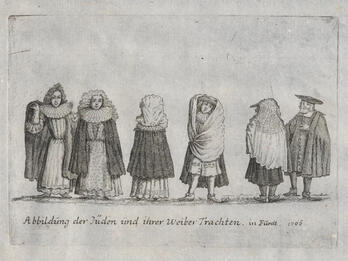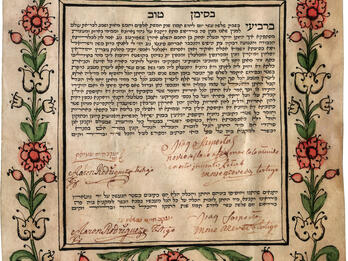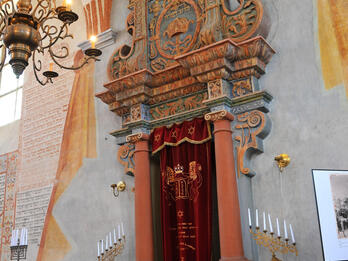Haskamot ha-‘ir Yerushalayim (Regulations of the City of Jerusalem)
Regulations of the City of Jerusalem—may it be rebuilt and established—as determined by the ancient rabbis of Jerusalem
On this day, 25th Adar, 5490:
- A ban, enforceable by excommunication, on producing counterfeit coins and transacting business with counterfeit coins. Even if these are given to an individual, he may not repair them himself.
- An agreement that no woman may wait [in synagogue] to hear the final Kaddish, and this applies to the morning, afternoon, and evening services.
- An agreement that no man or woman may collect any charity whatsoever without the consent of the court and the charity administrators.
- A decree, enforceable by excommunication, that anyone who strikes the first blow toward another inside the synagogue shall pay ten silver peraḥim [florins], which shall be used for communal needs, and he shall be placed under a five-day ban.
- An agreement that no man may negotiate a marriage proposal with a woman save by consent of the court.
- A decree, enforceable by excommunication, that every judge must observe the following terms: a) he may not hand over any Jew to the gentiles without having previously warned him two or three times in the presence of the seven representatives of the town; b) he may not touch any funds, not even from an inheritance, and not . . . to any person, nor may he offer a present or a meal, neither to any official nor to anyone else; c) he may not place anyone under a ban; d) he may not take any salary.
- An agreement that [official] buriers may not take a single penny from the wealthy, that they should defray all. . . .
- No woman may engage in business dealings. [ . . . ]
- A decree, enforceable by excommunication, prohibiting taking the poll tax, i.e., the royal head tax, from the permanent synagogue beadle.
- A decree, enforceable by excommunication, forbidding anyone to enter his divorced wife’s domain, and that no man may see his betrothed until his wedding night.
- No one may speak in the synagogue, or cry out, or raise his voice in such a manner that he causes confusion.
- Not to play dice, or cards, or any other game.
- A decree, enforceable by excommunication, against performing any magic or instructing a gentile to do so, even by way of friendship.
- An agreement not to purchase charcoal or wood other than from the fellahin [farmers] or from the shops. I too agreed. . . .
- No one may make any alteration in the prayers and the sacred songs—and this is enforceable by excommunication.
- To fine any man or woman who is late in bringing in the Sabbath. After the sages and the rabbis of Jerusalem, may it be speedily rebuilt, signed this agreement, they sent it to the rabbi of blessed memory, who wrote: “I too endorse this, and it is appropriate—David Ibn Zimra.”
- No one may recite Kaddish for a Jew other than before the Ark, nor may the curtain of the Ark be lent to individuals for their own honor.
- No woman may act as a guarantor, not even for her father or her husband, neither as a financial or a personal guarantee, unless it is a sum of up to forty coins, and no . . . .
- A temporary ban on purchasing anything that has the status of a stolen object, or if its status is uncertain.
- A ban, enforceable by excommunication, on selling meat through the medium of a gentile other than in the presence of a [Jewish] meat-supervisor.
Translated by
David E.
Cohen
.
Credits
The Jewish Community of Jerusalem, “Haskamot ha-‘ir Yerushalayim (Regulations of the City of Jerusalem)” (manuscript, Jerusalem, 1730). Published in: Sefer Dinaburg, ed. Ben Zion Dinur and Yitzhak Baer (Jerusalem: Kiryat Sefer, 1949), pp. 208–209.
Published in: The Posen Library of Jewish Culture and Civilization, vol. 5.





